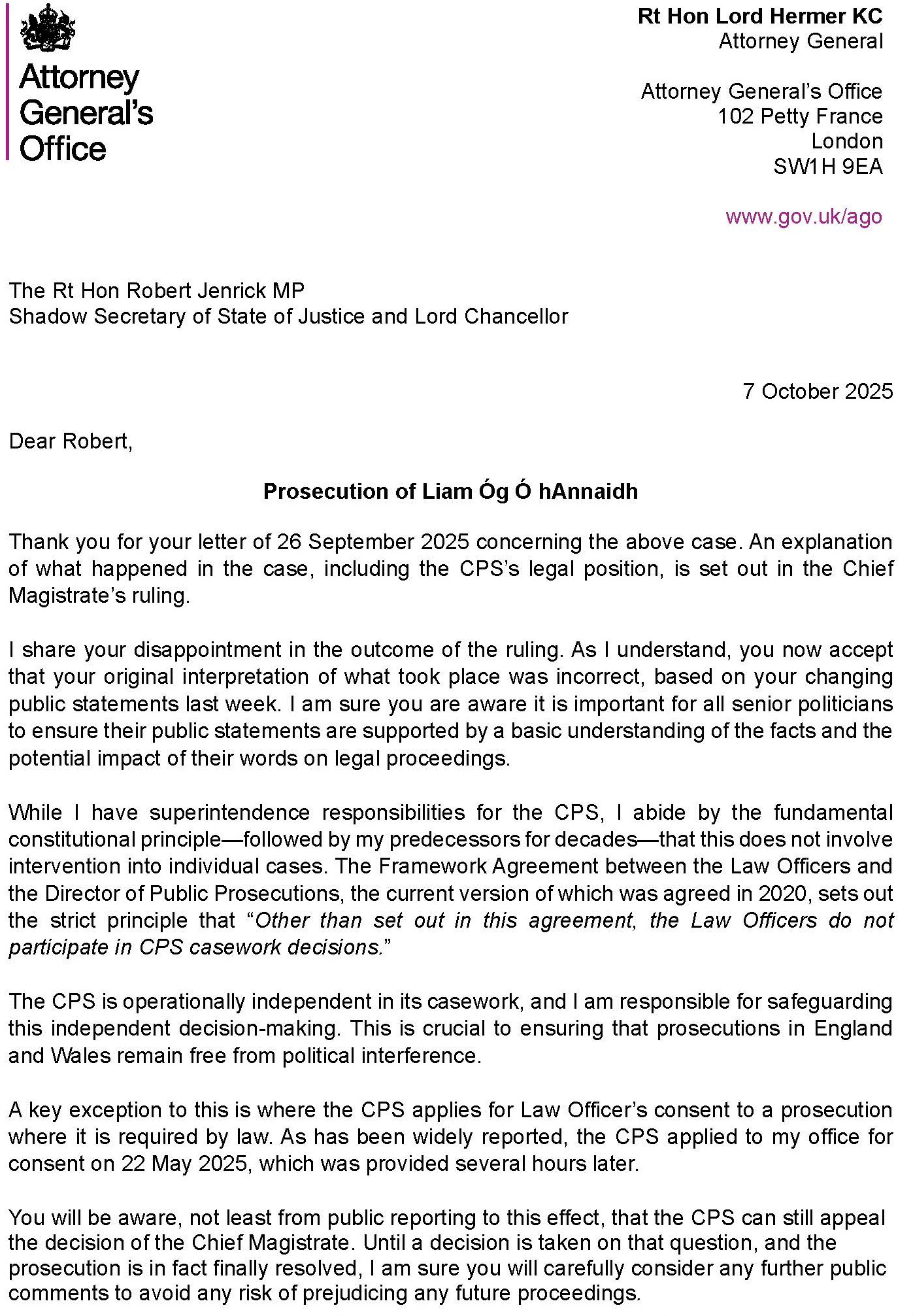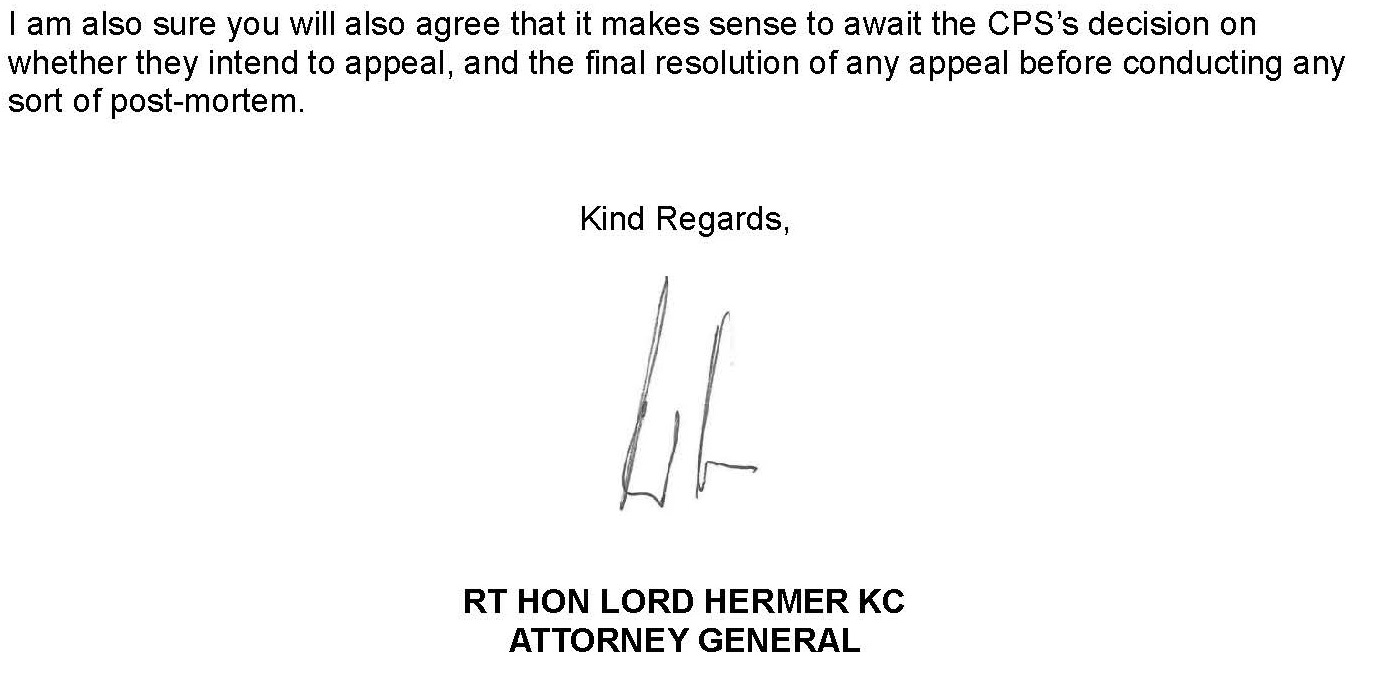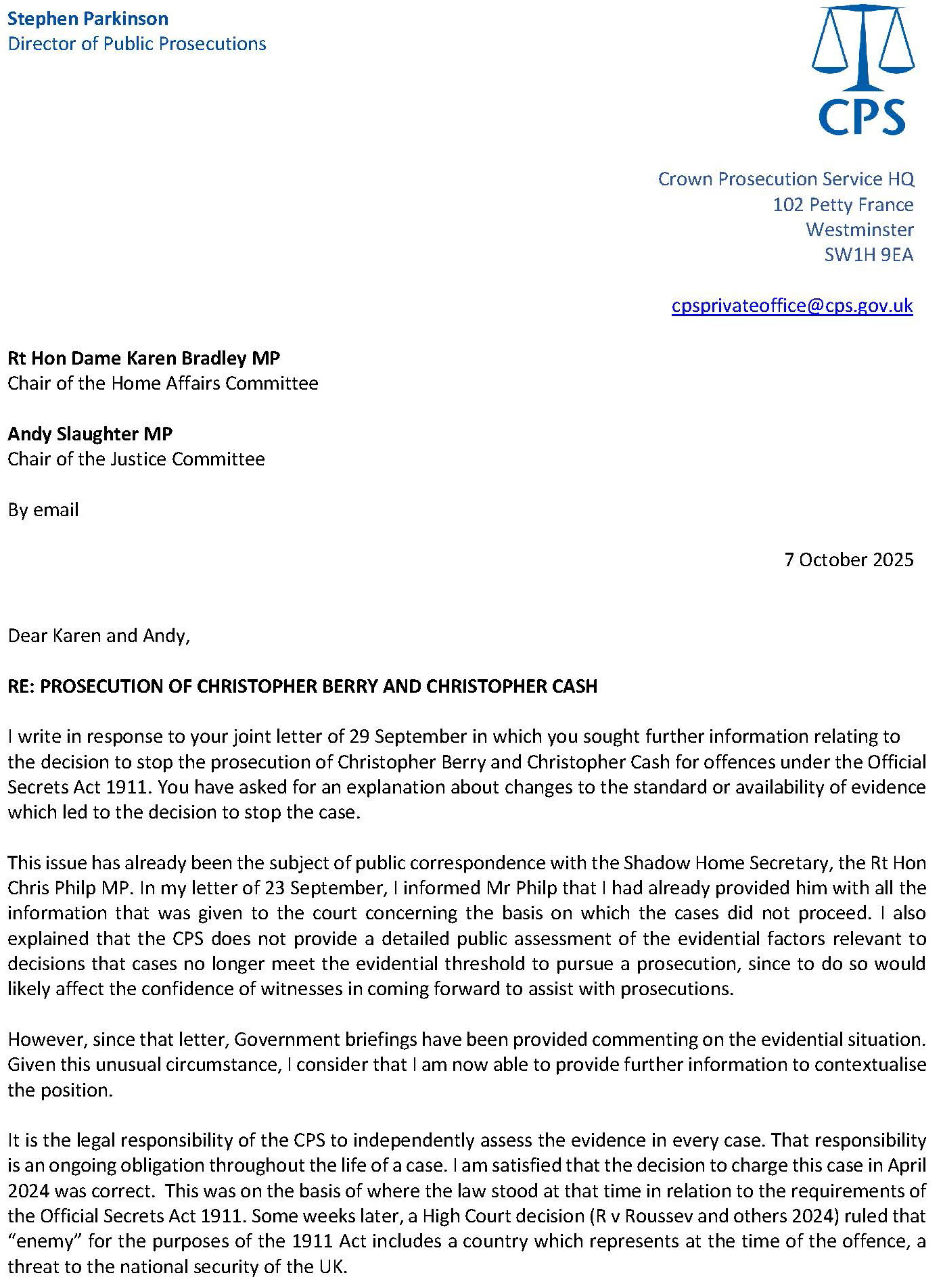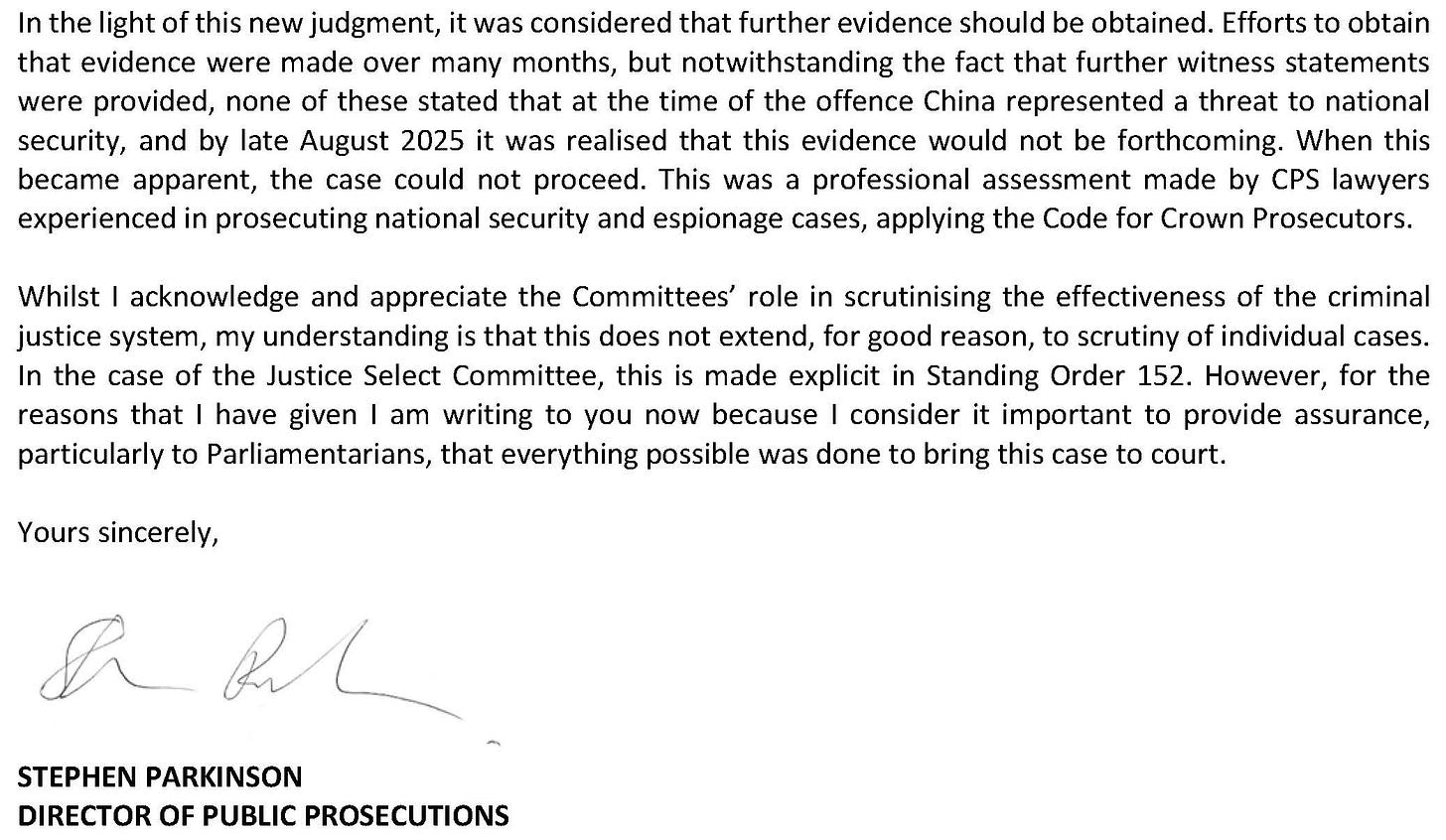Why cases collapsed
CPS explains why it dropped one prosecution but wants to revive another
The Crown Prosecution Service is to appeal against the acquittal of Liam Óg Ó hAnnaidh, also known as Liam O’Hanna, after a high-profile terrorism case collapsed at the end of last month.
In a separate development, the prosecution service has explained that it withdrew charges against two men who were suspected by MPs of spying for China because it had failed to obtain the evidence it regarded as necessary in the light of a court ruling in an unrelated case.
Kneecap
Ó hAnnaidh was accused of displaying a flag in a public place showing support for the banned terrorist organisation Hezbollah. An offence under section 13 of the Terrorism Act 2000 was said to have been committed on 21 November 2024 at a concert venue in London where the defendant was performing as part of a group called Kneecap. He denies the charge.
Acquitting Ó hAnnaidh on 26 September, the chief magistrate said he was not ruling on the defendant’s innocence or guilt.
“Nothing in this ruling should be read or interpreted as expressing any view, endorsement or rejection of the allegations themselves,” Senior District Judge Goldspring said. “The sole and discrete issue with which the court is concerned is whether it has jurisdiction to deal with the prosecution.”
Goldspring concluded that the attorney general’s permission had been needed before proceedings were instituted. As I explained last month, that could have been given before the six-month deadline had expired if Scotland Yard had not put off a charging decision until what it believed was the last possible moment.
In court, the prosecution service had argued unsuccessfully that the attorney general’s consent was not needed until a defendant answered the charges at a hearing. That is the point of law which prosecutors now wish to test. They say their interpretation is supported by case law. The defence argued that decided cases apply only to charges heard in the Crown Court.
Unlike the position where a defendant is acquitted by a jury in the Crown Court, either the prosecution or the defence may question proceedings in the magistrates’ courts within 21 days by asking the court “to state a case for the opinion of the High Court on the question of law or jurisdiction involved”.
Appeals “by way of case stated” are heard by a divisional court comprising two or more judges. No evidence is called. If the appeal is successful, a case can be sent back for trial in the magistrates’ court.
It’s not known whether the prosecution service would have challenged the point of law if the shadow justice secretary had not held the attorney general personally responsible. Robert Jenrick subsequently wrote to Lord Hermer KC, blaming the prosecution service.
In a letter first published by the Telegraph, Hermer told Jenrick shortly before the appeal was announced that senior politicians should “ensure that their public statements are supported by a basic understanding of the facts”:
China
The director of public prosecutions Stephen Parkinson replied yesterday to a letter from two House of Commons committees asking him why the Crown Prosecution Service, which he heads, had dropped charges against two defendants charged with espionage under the Official Secrets Act 1911, which has since been repealed. I discussed a slightly surreal consequence of the collapse last month.
Parkinson’s reply, also first published by the Telegraph, refers to a High Court decision last year in a case involving six Bulgarians convicted of spying for Russia. I think this may be a reference to a decision by the Court of Appeal on the meaning of the phrase “an enemy”.
Dismissing the defendants’ interlocutory appeal, the court said:
In our judgment, the 1911 act must be construed… in a common sense way… We agree with the judge that Russia would be “an enemy” if the jury concluded on the evidence that it was a country with whom the UK might some day be at war…
There is no reason in our view why the term “an enemy” should not include a country which represents a current threat to the national security of the UK. That formulation may well involve issues of fact and degree which the jury would be well-placed to assess, on evidence.
As the judge correctly observed, friendly powers would fall outside this definition.
As can be seen from Parkinson’s letter, this seems to have persuaded prosecutors that further evidence was needed:
There is disagreement over who was responsible for the refusing to provide the evidence that was supposedly needed. The prime minister, who was one of Parkinson’s predecessors, was reported by the Telegraph as appearing to blame prosecutors and the previous Conservative government.







The case stated is route to appeal is strewn with traps for the unwary, as I found from appeal from Weston-super-Mare magistrates twenty years ago.
In December 2003 I acted as solicitor and advocate for Alec Farley on an application by Child Support Agency to enforcement of arrears where he said he had paid direct to his wife for their children. The case started in Weston super Mare Magistrates’ Court. Two years later it was before the House of Lords (now the Supreme Court). Including his case stated appeal, Mr Farley he had four appeal hearings including before eight – yes eight – law lords.
The Weston justices refused to accept jurisdiction to deal with child support enforcement. Their clerk stated a case to the Administration Court, which came before Mr Justice Keith who said magistrates had no jurisdiction to hear whether Mr Farley was liable still to pay child support (Farley v Secretary of State for Work and Pensions [2004] EWHC 1655 (Admin) (12 July 2004) - https://www.bailii.org/ew/cases/EWHC/Admin/2004/1655.html). CSA could enforce. The Court of Appeal gave Mr Farley permission to appeal, heard the appeal (three lords: Lord Woolf (Lord Chief Justice), Lord Phillips (Master of the Rolls) and Lord Slynn (down for the day from the House of Lords, his last day sitting as a judge): Farley v CSA [2005] EWCA Civ 778, [2005] 2 FLR 1059 (25 January 2005) – https://www.bailii.org/ew/cases/EWCA/Civ/2005/778.html).
The House of Lords gave CSA permission to appeal. Only at that point did we all discover – and this should be watched for by both parties the Kneecap case as explained by Lord Woolf in the second Court of Appeal outing in Farley v CSA [2005] EWCA Civ 869, [2005] 2 FLR 1075 (22 June 2005): Supreme Court Act 1981 s 28(4) meant that the decision of Keith J was final and so no appeal lay to the Court of Appeal from that decision the High Court on an appeal by way of case stated is indeed a decision which is final and therefore no appeal lay from that decision to the Court of Appeal.
Senior Courts Act 1981 s 28A deals with ‘Proceedings on case stated by magistrates’ court’ and s 28(4) broadly says a decision of the High Court under s 28A is final. That is, we should none of us have been in the Court of Appeal at all. Mr Farley’s appeal should have been at an end before Mr Justice Keith. What was to be done? We were already on our way to the House of Lords who had given CSA permission to appeal.
By that time I had retained Richard Drabble QC to lead me for Mr Farley. And he recalled being in another case where a similar problem had arisen. The Court of Appeal could, he said, use its originating judicial review jurisdiction, to resolve the point. We were back on track, procedurally. In Farley v CSA (Secretary of State for Department of Work and Pensions) [2006] UKHL 31, [2006] FLR 12443, [2006] 1 WLR 1817 https://www.bailii.org/uk/cases/UKHL/2006/31.html their court consisting of Lords Hope, Hutton, Walker and Mance all agreed with Lord Nicholls that appeal of the Secretary of State should be allowed. Mr Farley was back to where he had been in December 2003 outside Weston Magistrates’ Court.
My best moment that day in the Lords was hearing Richard Drabble in a firm, but exasperated voice, telling the judges – in effect – to stop talking to each other and to listen to him.
Jenrick is unsuitable as Shadow Lord Chancellor. Even worse than Lammy